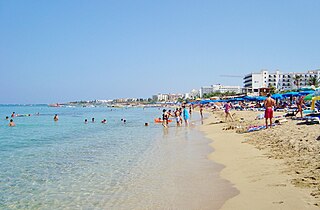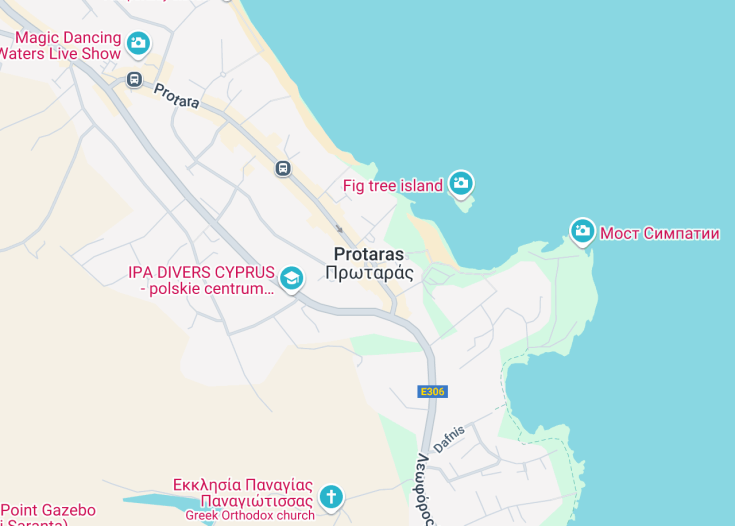Protaras, on Cyprus’s eastern coast, offers a beguiling blend of golden beaches and turquoise waters. Renowned for its soft sand and clear, calm seas, it’s a favored destination for families and water sports enthusiasts alike. The town itself exudes a warm, welcoming charm, complemented by an array of local and international dining options.
Beyond its coastal allure, Protaras also provides ample opportunities for cultural exploration, including the nearby historical site of the Greco-Roman ruins.
Before heading to the beaches of Protaras, consider visiting during the shoulder seasons of late spring or early autumn to enjoy fewer crowds and pleasant weather.
Book accommodations well in advance, especially if planning to visit Protaras during the peak summer months, to ensure a choice selection at competitive rates.
Top things to do & see in Protaras
Select the following sights and activities to discover best tickets and tours available in Protaras.
Protaras: A Mediterranean Gem
| Country | Cyprus |
| Time in Protaras | GMT+2 |
| Language spoken | Greek |
| Population | 20,230 (source: Cyprus Statistical Service) |
| Currency | Euro (€, EUR) |
| Airports |
|
Protaras, positioned on the southeastern coast of Cyprus, is a flourishing resort town renowned for its stunning stretches of golden sands and crystal-clear waters. Offering a scenic view of the Mediterranean Sea, Protaras is more than just a beach destination. Historically, Protaras and its surroundings have been inhabited since ancient times, evidenced by nearby historical sites that include Greco-Roman ruins at Salamis and the medieval architecture of Famagusta.
The town derives much of its character from its proximity to the dramatic Cape Greco, a national park notable for its rugged coastline and natural beauty. The unspoiled environment makes it an ideal spot for outdoor activities such as hiking, cycling, and snorkeling.
Protaras is also known for its vibrant nightlife and a plethora of dining options that provide both local and international cuisine, catering to the tastes of a diverse array of tourists. The area’s commitment to catering to visitors while maintaining its charm makes it a perfect balance of relaxation and entertainment. The town’s steady growth in infrastructure has also made it a favorable destination for family vacations, with numerous resorts, water parks, and child-friendly activities available.
The cultural aspect of Protaras can be observed in its celebrations and festivals, particularly during the summer which mesh traditional Cypriot culture with modern entertainment, appealing to both locals and tourists alike. With its rich mix of history, culture, and modern amenities, Protaras stands out as a comprehensive holiday spot able to satisfy those looking for leisure along with those wishing to explore the historical depth of Cyprus.
Where is Protaras?
Protaras is located in the Famagusta district on the east coast of Cyprus, facing the serene waters of the Mediterranean Sea.
Distances:
| Route | Distance by car | Time by car |
|---|---|---|
| Nicosia to Protaras | 52 miles | 1 hour 7 min |
| Larnaca to Protaras | 34 miles | 46 min |
| Limassol to Protaras | 71 miles | 1 hour 20 min |
What is Protaras famous for?
Protaras is most celebrated for its pristine beaches and family-friendly atmosphere. The Fig Tree Bay is notably famous for its beautiful sands and clear waters making it a top choice for sunbathers and water sports enthusiasts alike.
History
Ancient Origins: Before 300 BC
The area now known as Protaras has a history steeped in antiquity, tracing back to the Neolithic times. The region, specifically around the Cape Greco area, showed signs of early human activities, with discoveries suggesting small, primitive settlements where fishing and basic agriculture formed the cornerstone of their subsistence.
Byzantine and Medieval Era: 300 AD – 1500 AD
During the Byzantine period, Protaras, along with the rest of Cyprus, was a significant outpost for Christianity. The region saw the rise of several small chapels and religious sites. The medieval period further shaped the significance of Protaras with the construction of fortifications and watchtowers along the coastline to ward off pirates and invaders, serving as a notable point in defense against various incursions.
Ottoman Rule: 1571–1878
When the Ottoman Empire annexed Cyprus, Protaras fell under a new rule that influenced its cultural, architectural, and agricultural frameworks. The Ottomans introduced new crops and farming techniques, which significantly altered the local economy and landscape, integrating Protaras more deeply into the commercial networks of the Eastern Mediterranean.
British Administration to Independence: 1878–1960
Under British administration, Protaras began to modernize. Road networks were improved, enhancing the connectivity of the village with larger cities like Famagusta. This era also saw the rise of the salt industry, with salt being harvested from the local salt lakes, contributing to the economic activities of the region.
Modern Times: 1960–Present
The tourism industry began to take root in Protaras in the late 20th century, transforming the once quiet fishing villages into a bustling tourist destination renowned for its pristine beaches, clear waters, and vibrant nightlife. Today, Protaras is celebrated not only for its natural beauty but also as a beacon of hospitality welcoming visitors from around the globe. The town also continues to embrace its rich history, striking a balance between preserving its past and developing modern amenities.
Visit Protaras
What to see and do in Protaras, Cyprus.
Protaras, located on the eastern coast of Cyprus, is a vibrant beach town known for its stunning coastline and a variety of attractions. Visitors can explore:
- The breathtaking Fig Tree Bay, a magnificent beach with crystal-clear waters.
- Cape Greco National Park, ideal for hiking and nature walks.
- The Ocean Aquarium, which houses a diverse collection of marine species.
- Local churches like the Church of Profitis Elias, set atop a hill providing panoramic views of the area.
Beyond the beaches, Protaras offers watersports, cycling trails, and diving opportunities among ancient underwater ruins.
Annual Events in Protaras
Protaras is host to several annual events, particularly enriched in the summer months. Key events include the Protaras Summer Film Festival, offering open-air cinema experiences by the beach in July and August.
Another significant gathering is the Festival of the Flood, celebrated with music, dance, and traditional foods in June. These events showcase the vibrant culture and community spirit of Protaras.
Best time to visit Protaras
The ideal time to visit Protaras is between late spring and early autumn, particularly from May to October, when the weather is warm and sunny, making it perfect for beach activities and exploring the natural landscapes.
Is Protaras worth visiting?
Certainly, Protaras is worth a visit. With its combination of natural beauty, historical sites, and vibrant cultural scene, it ensures a rich and rewarding experience for all types of travelers.
The town offers stunning beaches, exciting local cuisine, and numerous recreational activities, making it a perfect destination for both relaxation and adventure.










